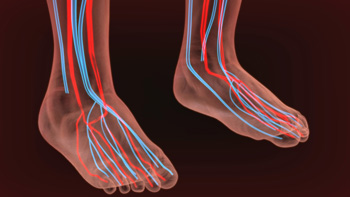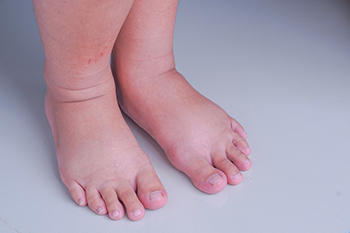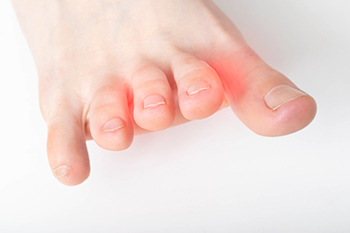
Patients who have poor circulation may notice their feet are cold, regardless of the temperature in the room. Additionally, having swollen feet may also be a sign of poor circulation. This may be a result of reduced blood flow, possibly causing the kidneys to function improperly. People who are constantly tired may have poor circulation, which can come from a lack of oxygen and nutrients. A weakened immune system and poor circulation may be linked together, possibly improving with regular exercise. Poor circulation can cause the scalp to become dry, and may lead to a gradual loss of hair. Patients who are afflicted with this condition may notice their nails are affected, as they can become fragile and break easier. If you have the above symptoms and your feet are affected, it is suggested that you confer with a podiatrist who can properly diagnose and treat poor circulation.
While poor circulation itself isn’t a condition; it is a symptom of another underlying health condition you may have. If you have any concerns with poor circulation in your feet contact one of our podiatrists of Palmetto Podiatry Group of Anderson. Our doctors will treat your foot and ankle needs.
Poor Circulation in the Feet
Peripheral artery disease (PAD) can potentially lead to poor circulation in the lower extremities. PAD is a condition that causes the blood vessels and arteries to narrow. In a linked condition called atherosclerosis, the arteries stiffen up due to a buildup of plaque in the arteries and blood vessels. These two conditions can cause a decrease in the amount of blood that flows to your extremities, therefore resulting in pain.
Symptoms
Some of the most common symptoms of poor circulation are:
- Numbness
- Tingling
- Throbbing or stinging pain in limbs
- Pain
- Muscle Cramps
Treatment for poor circulation often depends on the underlying condition that causes it. Methods for treatment may include insulin for diabetes, special exercise programs, surgery for varicose veins, or compression socks for swollen legs.
As always, see a podiatrist as he or she will assist in finding a regimen that suits you. A podiatrist can also prescribe you any needed medication.
If you have any questions, please feel free to contact our office located in Anderson, SC . We offer the newest diagnostic and treatment technologies for all your foot care needs.

Having swollen feet is uncomfortable. There are various reasons why this condition can happen, ranging from pregnancy to eating foods that are laden with sodium. Swollen feet can also be accompanied by skin that is tight, puffy, and shiny, and depending on its severity, may cause difficulty in walking. Additionally, there may be existing medical conditions that can lead to having swollen feet. These can include heart failure, kidney disease, or venous insufficiency. Swollen feet may happen from having a sedentary lifestyle, and it can be helpful to include gentle exercise into the daily routine. Pregnant women may wish to reduce sodium intake and drink plenty of water daily may help to combat swollen feet and ankles. If you have swollen feet, it is suggested that you confer with a podiatrist who can offer additional methods.
Swollen feet can be a sign of an underlying condition. If you have any concerns, contact one of our podiatrists of Palmetto Podiatry Group of Anderson. Our doctors can provide the care you need to keep you pain-free and on your feet.
Swollen feet are a common ailment among pregnant women and people who stand or sit for extended periods. Aging may increase the possibility of swollen feet and patients who are obese often notice when their feet are swelling too. There may be medical reasons why swollen feet occur:
- Phlebitis - A condition that causes the veins to become inflamed and can also cause leg pain.
- Liver disease - This may lead to low blood levels of albumin which is a protein. This can cause fluid in the blood to pass into the tissues and several areas of the body can become swollen.
- Heart failure - When the heart doesn’t pump properly the blood that is normally pumped back to the heart can pool in the veins of the legs causing swollen feet.
- Kidney disease - One of the main functions of the kidneys is releasing excess fluid in the body. This type of condition can make it difficult for the kidneys to function properly, and as a result the feet may become swollen.
- Deep-vein thrombosis (DVT)- This is a serious condition where blood clots form in the veins of the legs. They can block the return of blood from the legs to the heart which may cause the feet to swell. It is important to be treated by a podiatrist if this condition is present.
Swollen feet can also be caused by bone and tendon conditions, including fractures, arthritis, and tendinitis. Additionally, there may be skin and toenail conditions and an infection may cause the feet to swell. Patients who take medicine to treat high blood pressure may be prone to getting swollen feet.
Many patients elevate their feet to help relieve the swelling and this is generally a temporary remedy. When a podiatrist is consulted the reason behind the swelling can be uncovered and subsequently treated.
If you have any questions please feel free to contact our office located in Anderson, SC . We offer the newest diagnostic tools and technology to treat your foot and ankle needs.

A compressed or irritated growth that is found between the third and fourth toes can represent a foot condition known as Morton’s neuroma. It is considered to be benign, despite how painful it can be. Wearing shoes that do not have enough room for the toes to move freely can be a common cause for this condition to occur. High heels fit into this category, and women who frequently wear this type of shoe may be affected. People who are afflicted with this ailment often feel they have a small pebble in their shoe or sock, typically on the ball of the foot. This part of the foot is used for standing and walking, which can cause constant pain. Patients who notice the beginning signs of Morton’s neuroma may find temporary relief when better shoes are worn. For more severe cases, it is suggested that you consult with a podiatrist who can provide you with permanent relief solutions.
Morton’s neuroma is a very uncomfortable condition to live with. If you think you have Morton’s neuroma, contact one of our podiatrists of Palmetto Podiatry Group of Anderson. Our doctors will attend to all of your foot care needs and answer any of your related questions.
Morton’s Neuroma
Morton's neuroma is a painful foot condition that commonly affects the areas between the second and third or third and fourth toe, although other areas of the foot are also susceptible. Morton’s neuroma is caused by an inflamed nerve in the foot that is being squeezed and aggravated by surrounding bones.
What Increases the Chances of Having Morton’s Neuroma?
- Ill-fitting high heels or shoes that add pressure to the toe or foot
- Jogging, running or any sport that involves constant impact to the foot
- Flat feet, bunions, and any other foot deformities
Morton’s neuroma is a very treatable condition. Orthotics and shoe inserts can often be used to alleviate the pain on the forefront of the feet. In more severe cases, corticosteroids can also be prescribed. In order to figure out the best treatment for your neuroma, it’s recommended to seek the care of a podiatrist who can diagnose your condition and provide different treatment options.
If you have any questions, please feel free to contact our office located in Anderson, SC . We offer the newest diagnostic and treatment technologies for all your foot care needs.

